Justin James
Applications Engineer, iRODS Consortium

Lustre iRODS Connector
Open Source Data Management
for a Parallel File System
Lustre iRODS Connector
Open Source Data Management
for a Parallel File System
April 26, 2018
Lustre User Group 2018
Argonne National Laboratory
Quick iRODS Overview

iRODS is
- Open source
- Distributed
- Metadata Driven
- Data Centric
A flexible framework for the abstraction of infrastructure
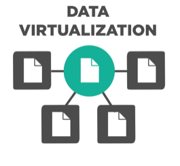
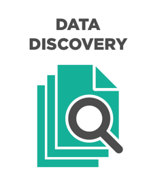
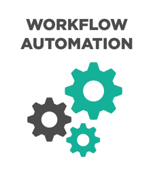
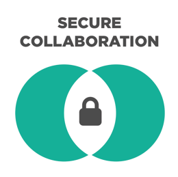
iRODS as the Integration Layer


iRODS Overview - Data Virtualization


Combine various distributed storage technologies into a Unified Namespace
- Existing file systems (Lustre, etc.)
- Cloud storage
- On premises object storage
- Archival storage systems
iRODS provides a logical view into the complex physical representation of your data, distributed geographically, and at scale.
iRODS Overview - Data Virtualization

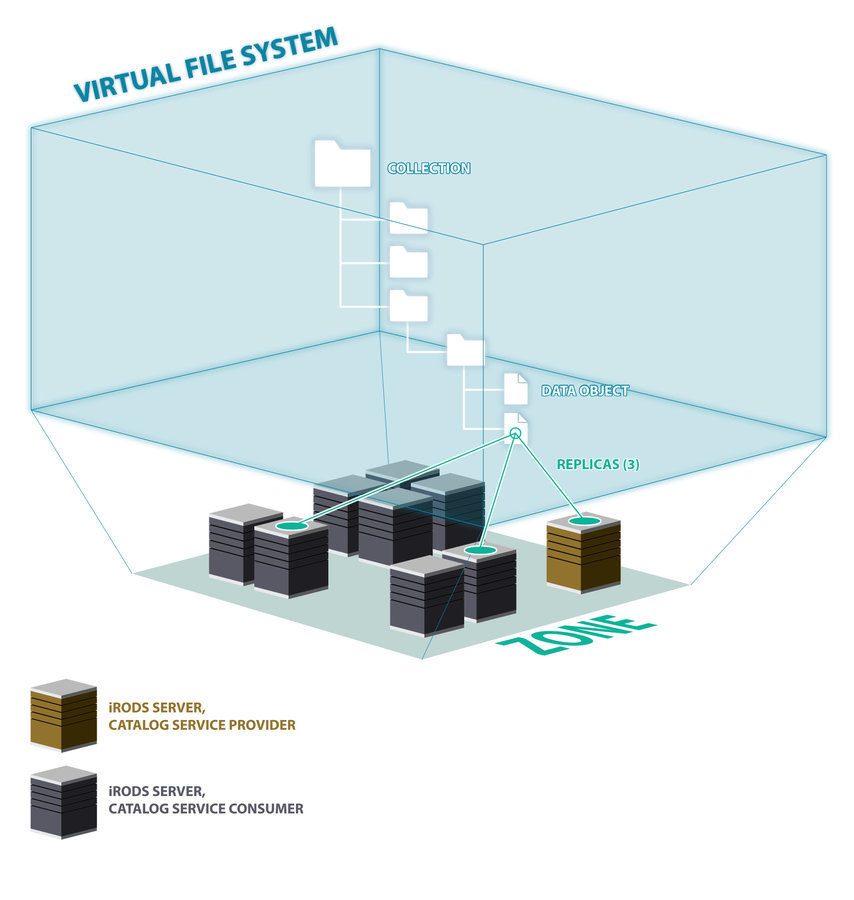
Logical Path
Physical Paths(s)
iRODS Overview - Data Discovery

Attach metadata to any first class entity within the iRODS Zone
- Data Objects
- Collections
- Users
- Storage Resources
- The Namespace
iRODS provides automated and user-provided metadata which makes your data and infrastructure more discoverable, operational and valuable.

Metadata Everywhere

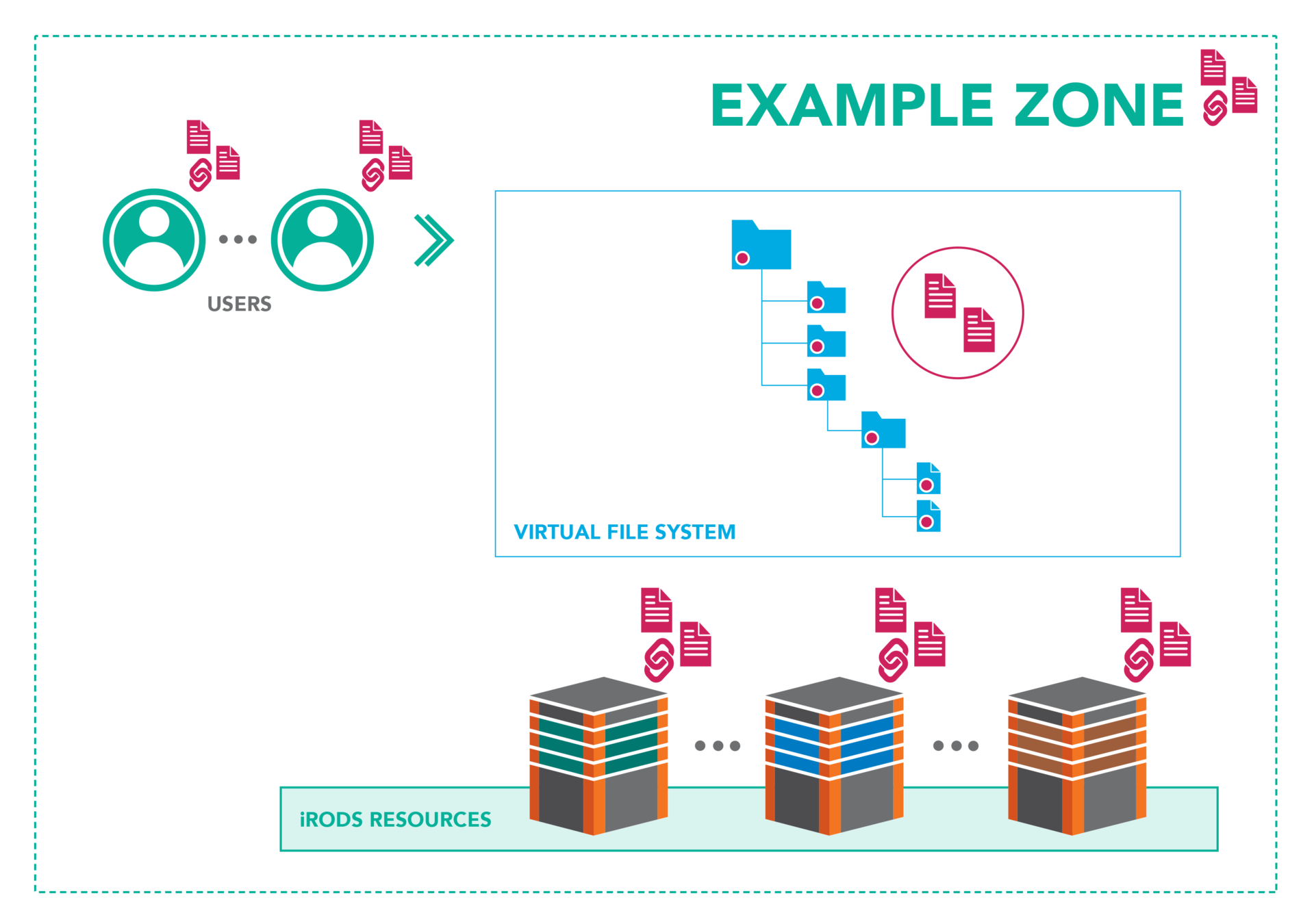
iRODS Overview - Workflow Automation

Integrated scripting language which is triggered by any operation within the framework
- Authentication
- Storage Access
- Database Interaction
- Network Activity
- Extensible RPC API

The iRODS rule engine provides the ability to capture real world policy as computer actionable rules which may allow, deny, or add context to operations within the system.
Dynamic Policy Enforcement

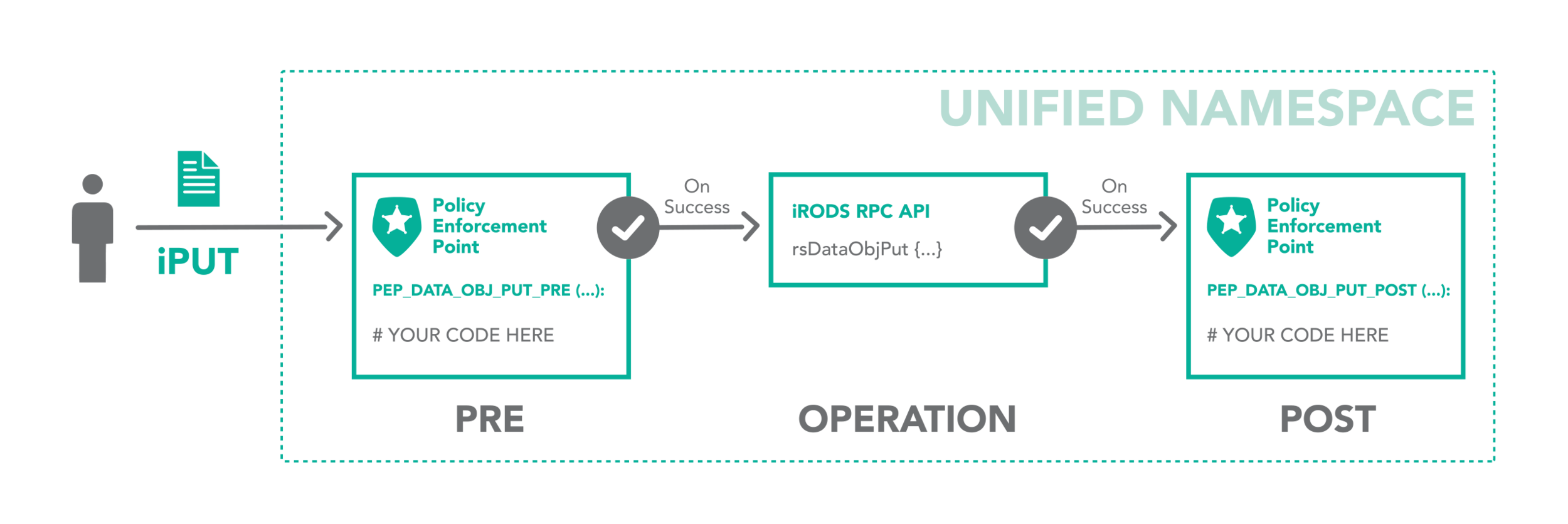
- restrict access
- log for audit and reporting
- provide additional context
- send a notification
The iRODS rule may:
Dynamic Policy Enforcement

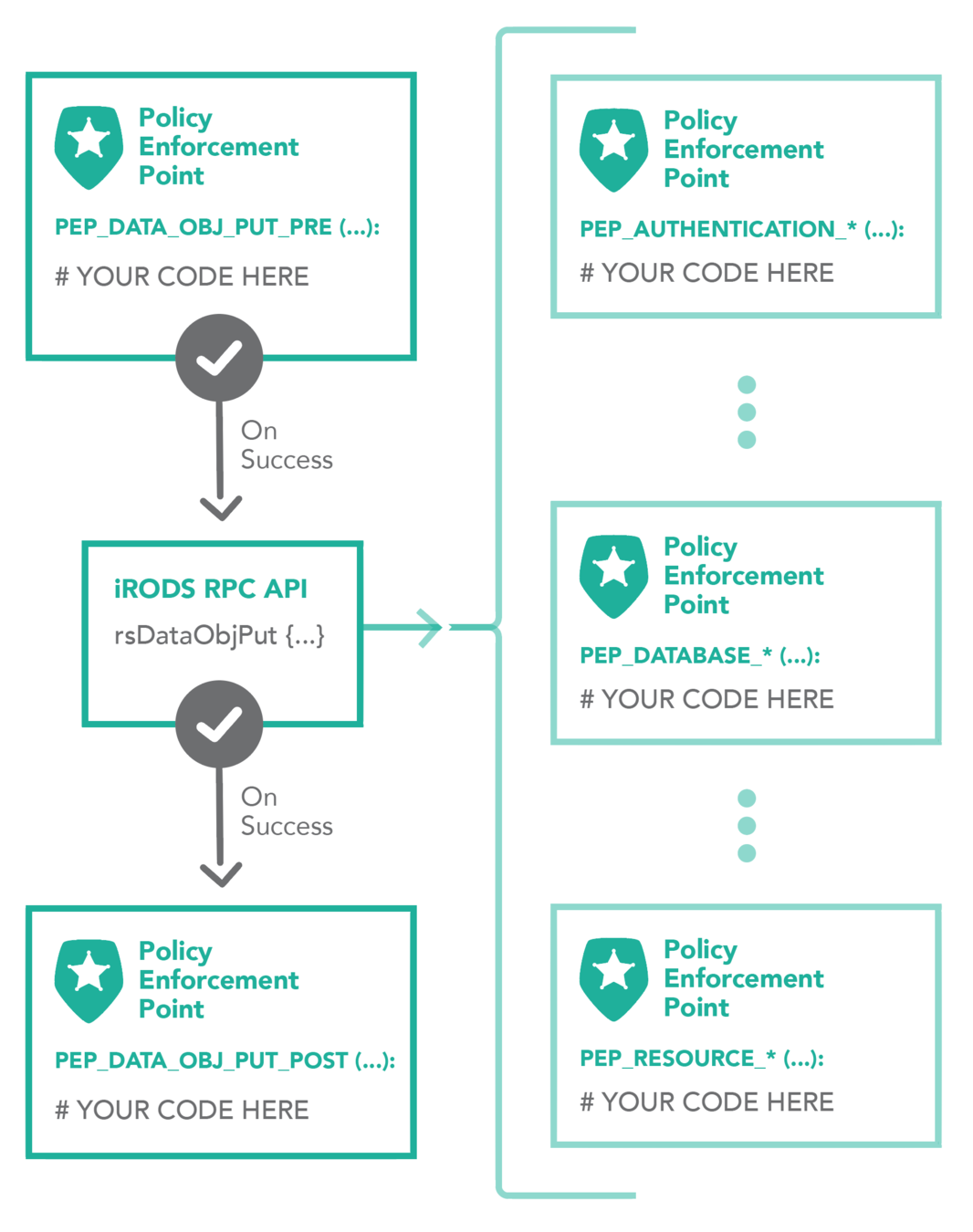
A single API call expands to many plugin operations all of which may invoke policy enforcement
- Authentication
- Database
- Storage
- Network
- Rule Engine
- Microservice
- RPC API
Plugin Interfaces:
Secure Collaboration

iRODS allows for collaboration across administrative boundaries after deployment
- No need for common infrastructure
- No need for shared funding
- Affords temporary collaborations
iRODS provides the ability to federate namespaces across organizations without pre-coordinated funding or effort.

iRODS Service Interface

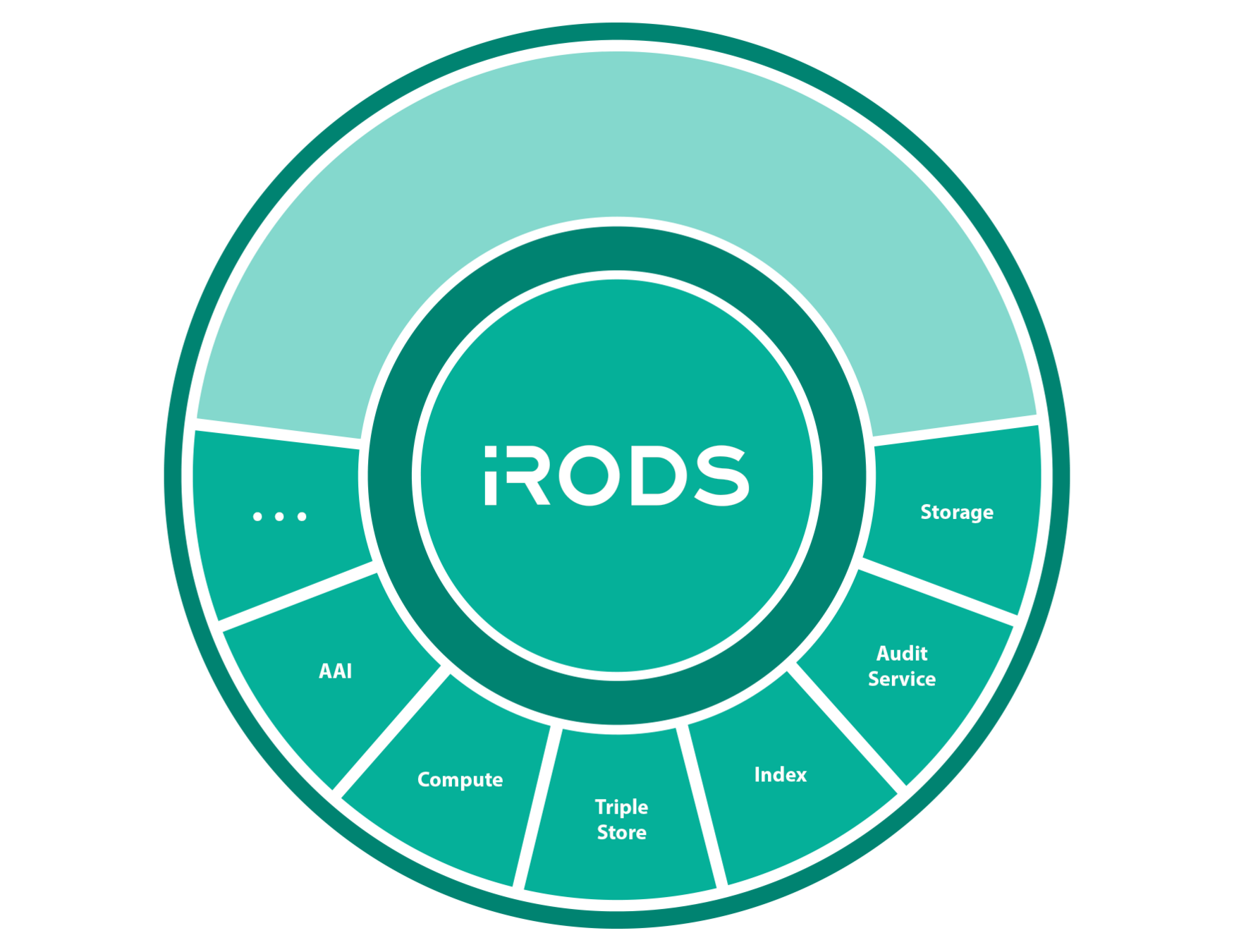
iRODS Overview - Federation - Shared Data and Services

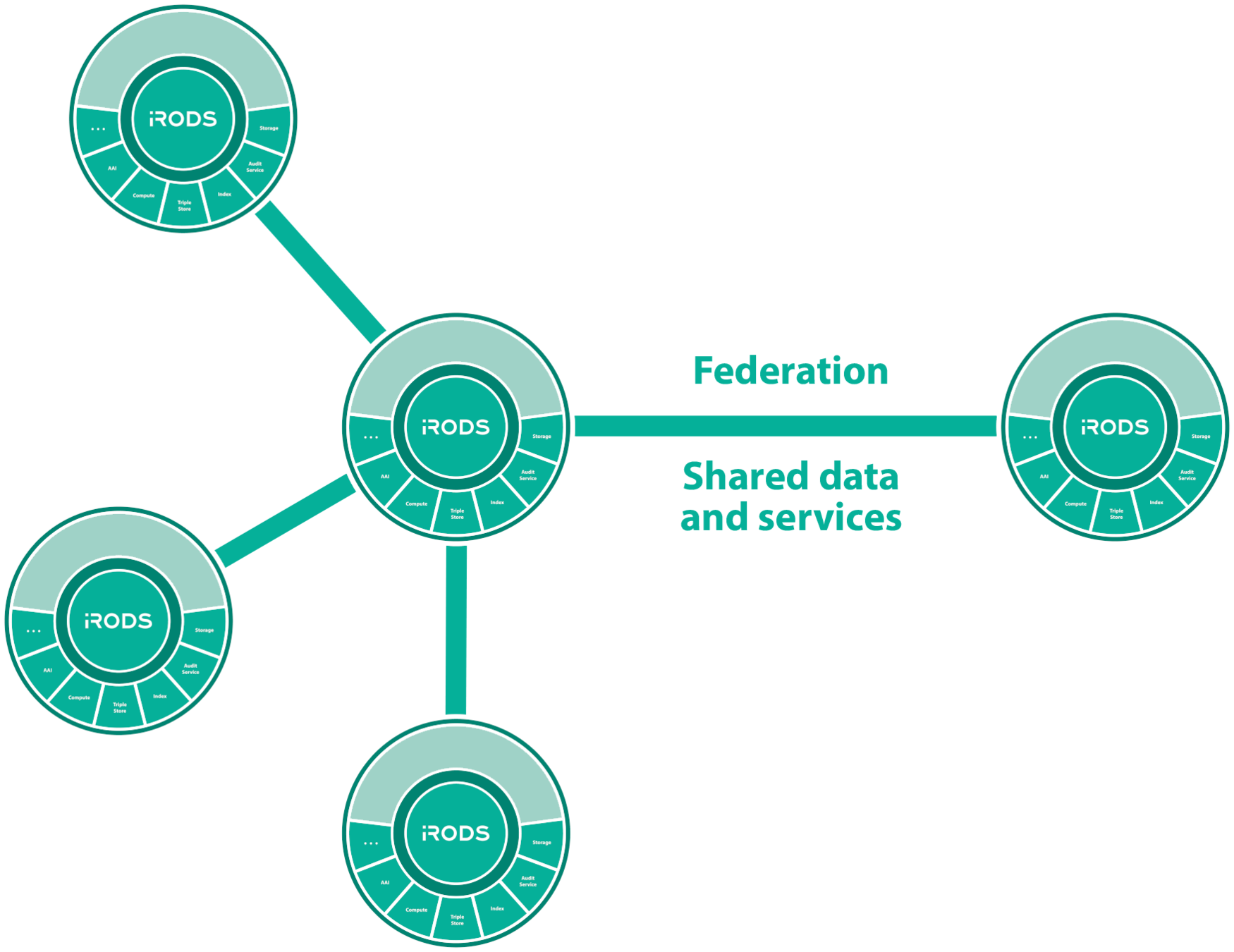
Institutional repositories

As data matures and reaches a broader community, data management policy must also evolve to meet these additional requirements.

Motivation - Capturing the Products

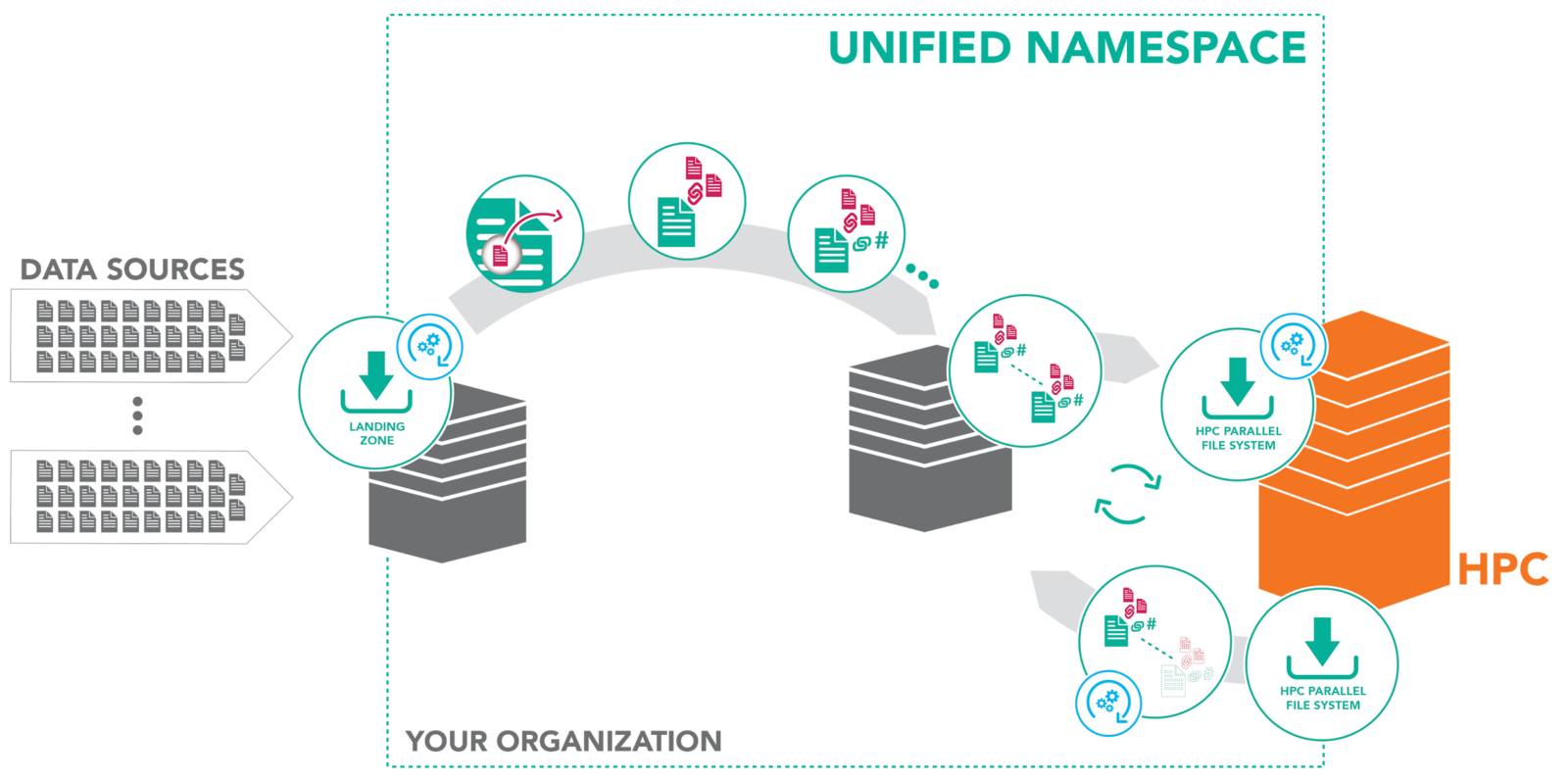
Focus on the bottom right hand side of the image
iRODS Lustre Framework

iRODS Lustre Framework - Rationale

-
Users want iRODS features (user metadata, policies, etc.) while maintaining native Lustre filesystem access for users.
- iRODS already supports POSIX filesystems
- An iRODS vault can be located within a Lustre mount point
- However, this approach has some drawbacks:
- All modifications must go through the iRODS API
- Changes made directly to the filesystem will not be detected by iRODS leading to drift between the filesystem and the iRODS catalog
- Existing tools must be rewritten to accommodate the iRODS API
- Does not take advantage of the highly efficient and distributed nature of Lustre
iRODS Lustre Framework - Design

- Add iRODS features on top of the Lustre filesystem
- Users may continue to directly access filesystem.
- Use the Lustre changelog to keep iRODS data objects and collections in sync with the Lustre filesystem.
- All catalog updates are in-place registrations only. No data copies are required.
- Keep iRODS out of the critical data path. Performance of the Lustre cluster is not impacted.
- Users may continue to directly access filesystem.
iRODS Lustre Framework - Efficiency Considerations

- Accumulate and aggregate updates
- Lustre Connector uses multiple threads to send batched updates to iRODS in parallel
- A plugin that resides within iRODS receives and processes the bulk updates
- Support scaling with multiple iRODS endpoints and a distributed database
iRODS Lustre Framework - Overview


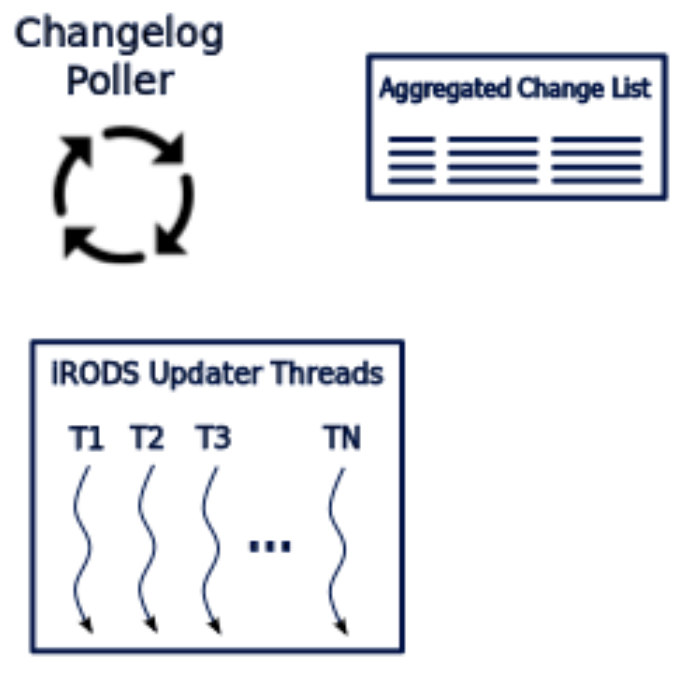
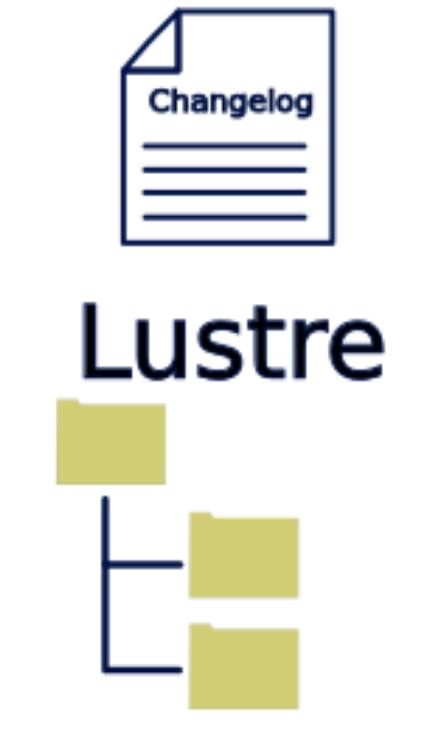
iRODS Lustre Connector
iRODS API Plugin
iRODS Lustre Framework - iRODS API Plugin

- A dedicated iRODS API plugin within iRODS accepts and processes bulk updates from the iRODS Lustre Connector.
- There are two modes for the iRODS API plugin:
- Direct - Plugin performs direct database updates. This plugin bypasses the iRODS API architecture. Prioritizes efficiency over policy.
- Policy - Plugin performs updates via iRODS API. This executes all policy enforcement points (PEPs) within iRODS. Prioritizes policy over speed.
- Direct - Plugin performs direct database updates. This plugin bypasses the iRODS API architecture. Prioritizes efficiency over policy.
iRODS Lustre Framework - Example

[root@zfs1 ~]# mount -t lustre 192.168.56.31@tcp1:/lustre01 /lustre01
[root@zfs1 bld]# echo 'this is a test' > /lustre01/testfile.txt && ils
/tempZone/lustre:
C- /tempZone/lustre/dir1
[root@zfs1 bld]# ils
/tempZone/lustre:
testfile.txt
C- /tempZone/lustre/dir1
[root@zfs1 bld]# iget testfile.txt -
this is a test
[root@zfs1 bld]# imeta add -d testfile.txt description 'just a test file'
[root@zfs1 bld]# imeta ls -d testfile.txt
AVUs defined for dataObj testfile.txt:
attribute: description
value: just a test file
units:
----
attribute: lustre_identifier
value: 0x20000cf21:0x3:0x0
units:
[root@zfs1 bld]# mv testfile.txt dir1
[root@zfs1 bld]# ils dir1
/tempZone/lustre/dir1:
test4.txt
testfile.txt
iRODS Lustre Framework - Configuration

{
"mdtname": "lustre01-MDT0000",
"lustre_root_path": "/lustre01",
"irods_register_path": "/tempZone/lustre",
"irods_resource_name": "demoResc",
"irods_api_update_type", "policy",
"log_level": "LOG_INFO",
"changelog_poll_interval_seconds": 1,
"irods_client_connect_failure_retry_seconds": 30,
"irods_client_broadcast_address": "ipc:///irods_client_broadcast_events",
"changelog_reader_broadcast_address": "ipc:///changelog_reader_broadcast_events",
"changelog_reader_push_work_address": "ipc:///changelog_reader_push_work_events",
"result_accumulator_push_address": "ipc:///result_accumulator_push_address",
"irods_updater_thread_count": 5,
"maximum_records_per_update_to_irods": 200,
"maximum_records_to_receive_from_lustre_changelog": 500,
"message_receive_timeout_msec": 2000,
"thread_1_connection_parameters": {
"irods_host": "localhost",
"irods_port": "1247"
},
"thread_2_connection_parameters": {
"irods_host": "localhost",
"irods_port": "1247"
}
}Notable Configuration Entries
- MDT Name
- Mount Point Available to iRODS
- Registration Point in iRODS
- Multiple iRODS Endpoints - If not defined, use iRODS environment
iRODS Automated Ingest Capability

- Based on Redis for distributed job scheduling
- Designed to solve two particular use cases:
- Onboarding of existing body of data
- discovery and registration of files into iRODS catalog
- on-the-fly metadata extraction
- does not rely on the Lustre changelog
- Disaster recovery
- can be run periodically to sync iRODS catalog with Lustre MDS
- does not rely on the Lustre changelog
- Onboarding of existing body of data
Goal: iRODS - Parallel and Distributed, Front-to-Back

- Parallel Filesystem
- Automated Ingest Capability
- iRODS
- with multipart, soon
- with distributed database plugin
- Auditing Framework
- Indexing Framework
iRODS CockroachDB Database Plugin

-
CockroachDB is a distributed database which supports an SQL query interface.
- With CockroachDB, iRODS may have multiple catalog (database) providers within an iRODS grid.
- The iRODS Lustre connector allows you to assign different endpoints to different threads.
- When used with CockroachDB, this allows horizontal scaling of processing Lustre updates without encountering a bottleneck at the database.
iRODS Lustre Framework - Demonstration

Copy 1000 files into Lustre
# cp -r /1000files /lustre01/
[root@zfs1 lustre01]# ils
/tempZone/lustre:
C- /tempZone/lustre/1000files
# iquest "select count(DATA_NAME)"
DATA_NAME = 1000
------------------------------------------------------------
# ils 1000files
/tempZone/lustre/1000files:
C- /tempZone/lustre/1000files/dir1
C- /tempZone/lustre/1000files/dir10
C- /tempZone/lustre/1000files/dir2
C- /tempZone/lustre/1000files/dir3
C- /tempZone/lustre/1000files/dir4
C- /tempZone/lustre/1000files/dir5
C- /tempZone/lustre/1000files/dir6
C- /tempZone/lustre/1000files/dir7
C- /tempZone/lustre/1000files/dir8
C- /tempZone/lustre/1000files/dir9
# ils 1000files/dir1 | head -10
/tempZone/lustre/1000files/dir1:
file1
file10
file100
file11
file12
file13
file14
file15
file16 iRODS Lustre Framework - Demonstration

Enable policy
{
"mdtname": "lustre01-MDT0000",
"lustre_root_path": "/lustre01",
"irods_register_path": "/tempZone/lustre",
"irods_resource_name": "demoResc",
"irods_api_update_type", "policy",
...
...Enable a rule to extract metadata from image files on registration
acPostProcForFilePathReg {
*err = errormsg(msiExecCmd("read_exif.py", $filePath, "null", "null", "null", *std_out_err), *msg)
msiGetStdoutInExecCmdOut(*std_out_err,*std_out);
writeLine("serverLog", "XXXX - STDOUT [*std_out]")
if(*err != 0) {
writeLine( "serverLog", "FAILED: [*cmd_opt] [*err] [*msg]" )
failmsg(*err,*cmd_opt)
} else {
msiString2KeyValPair(*std_out, *kvp)
msiSetKeyValuePairsToObj(*kvp, $objPath, "-d")
}
}iRODS Lustre Framework - Demonstration

Enable Policy and Use a Rule to Extract Metadata
# cp ~/images/stickers.jpg .
# imeta ls -d stickers.jpg | head -20
AVUs defined for dataObj stickers.jpg:
attribute: Image Orientation
value: Horizontal (normal)
units:
----
attribute: EXIF ColorSpace
value: sRGB
units:
----
attribute: lustre_identifier
value: 0x20000cf24:0x14b74:0x0
units:
----
attribute: EXIF FNumber
value: 11/5
units:
----
attribute: GPS GPSDestBearingRef
value: T
units: Lustre iRODS Connector
By iRODS Consortium
Lustre iRODS Connector
An overview of the Lustre connector for iRODS.
- 1,426



